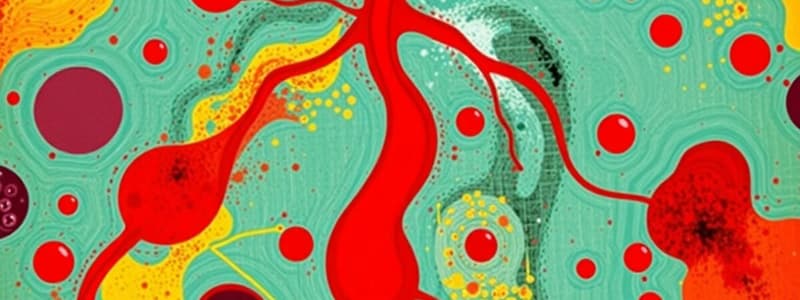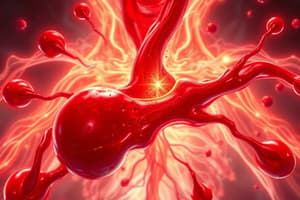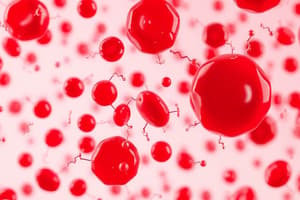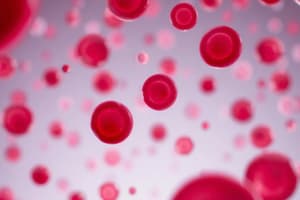Podcast
Questions and Answers
What type of hematopoietic tissue is primarily responsible for producing blood cells?
What type of hematopoietic tissue is primarily responsible for producing blood cells?
- Red Bone Marrow (correct)
- Fat Tissue
- Epithelial Tissue
- Cartilage
Where is lymphatic tissue primarily found?
Where is lymphatic tissue primarily found?
- In the spleen and lymph nodes (correct)
- In the spinal cord
- In the liver
- In the adrenal glands
Which of the following statements is true regarding red bone marrow?
Which of the following statements is true regarding red bone marrow?
- It exclusively produces lymphocytes.
- It is only found in the ribs and vertebrae.
- It is located in flat and irregular bones. (correct)
- It does not play a role in blood cell production.
What type of white blood cell is specifically produced by lymphatic tissue?
What type of white blood cell is specifically produced by lymphatic tissue?
Which of the following is NOT a location where hematopoietic tissue is found?
Which of the following is NOT a location where hematopoietic tissue is found?
What is the main protein found in plasma?
What is the main protein found in plasma?
What percentage of blood volume is made up of formed elements?
What percentage of blood volume is made up of formed elements?
What is termed as the percentage of cells in a blood sample?
What is termed as the percentage of cells in a blood sample?
What happens to blood viscosity if the number of red blood cells decreases?
What happens to blood viscosity if the number of red blood cells decreases?
Which formed element is responsible for the buffy coat in blood samples?
Which formed element is responsible for the buffy coat in blood samples?
What is the main function of blood in relation to oxygen?
What is the main function of blood in relation to oxygen?
Which of the following best describes plasma?
Which of the following best describes plasma?
How does blood contribute to the body's defense mechanisms?
How does blood contribute to the body's defense mechanisms?
What percentage of blood is made up of plasma?
What percentage of blood is made up of plasma?
What is NOT a function of blood?
What is NOT a function of blood?
Flashcards are hidden until you start studying
Study Notes
Blood Functions
- Blood serves as a transport medium, moving throughout the body.
- Delivers oxygen to cells.
- Removes waste products from cells.
- Delivers nutrients, hormones, enzymes, and other substances throughout the body.
- Protects the body against infection.
- Stabilizes the body's acid-base balance.
- Regulates body temperature.
Components of Blood
- Plasma is the liquid connective tissue, making up 55% of blood.
- Water is the main component of plasma.
- Albumin is the main protein found in plasma.
- Plasma plays a role in blood clotting, immune system function, and regulating fluid volume.
- Serum is plasma without clotting proteins.
Formed Elements
- Formed elements, which include blood cells and cell fragments, comprise 45% of blood.
- These cells include red blood cells (RBCs), white blood cells (WBCs), and platelets.
- The buffy coat is a narrow, buff-colored band beneath the plasma, made up of WBCs and platelets.
- RBCs are the heaviest formed element and make up most of the formed elements.
- Hematocrit is the percentage of cells in a blood sample.
Blood Viscosity
- Viscosity refers to the thickness or stickiness of a fluid.
- Decreased RBCs lead to thinner, less viscous blood, causing rapid flow.
- Increased RBCs increase viscosity, resulting in sluggish blood flow.
Blood Cell Formation
- Hemopoiesis is the production of blood.
Hematopoietic Tissue
- Red bone marrow produces blood cells and is found in the ends of long bones and flat, irregular bones.
- Lymphatic tissue produces lymphocytes, a specific type of WBC, and is found in the spleen, lymph nodes, and thymus glands.
Studying That Suits You
Use AI to generate personalized quizzes and flashcards to suit your learning preferences.




